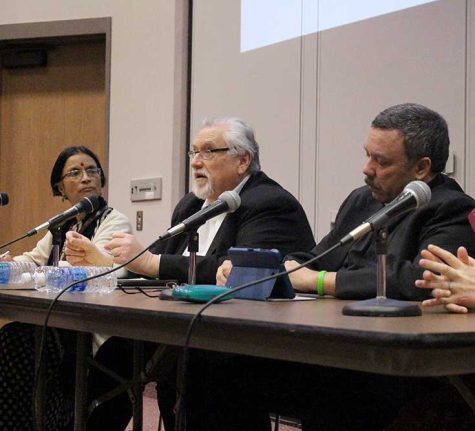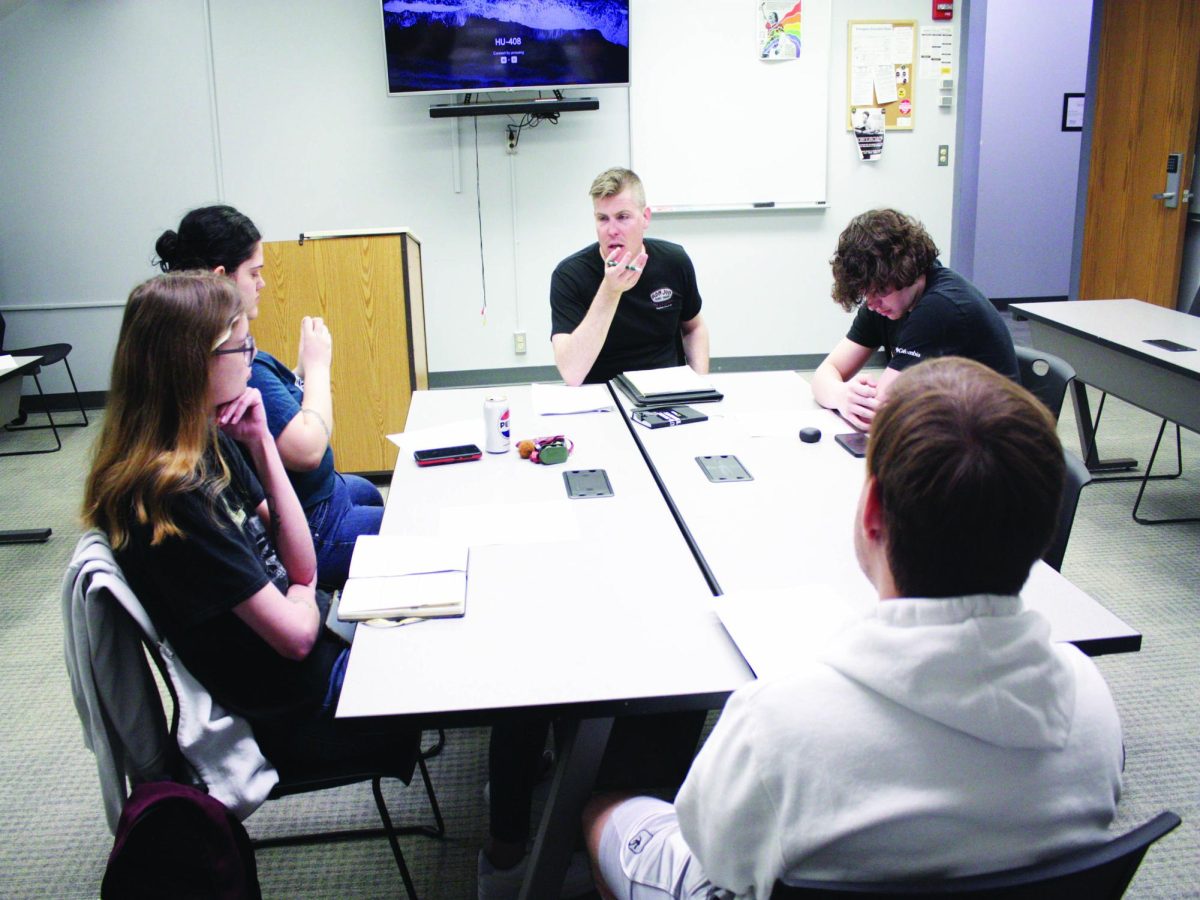Believers

Believers of four different world religions: Dr. Meena Dalal, a follower of Hindu; Gary Weddel, a follower of Baha’i; and Pastor Douglas Dill, a Lutheran pastor discussed their faith with the campus community on March 14. Not pictured: Bronwyn Zitka
March 22, 2017
Members of four different world religions discussed their beliefs at the third annual Interfaith Panel at Wayne State College on Mar. 14.
The event was put on by the Interfaith Action group. Previous panels have covered religions of the Middle East and Native American tribes of Nebraska.
Speakers on the panel were Dr. Meena Dalal, a follower of Hindu; Gary Weddel, a follower of Baha’i; Pastor Douglas Dill, a Lutheran pastor; and Bronwyn Zitka, a follower of Wicca.
Dalal teaches economics in the Department of Business and Economics at WSC. She was born and raised in Calcutta (Kolkata), India, and received her undergraduate degree from Calcutta University before moving to the United States and living in Boston and Berkeley, Calif. She received her Ph.D. in economics from Northeastern University in Boston.
Dalal has been a follower of Hindu her entire life.
“You are Hindu once you are born,” Dalal said. “You cannot convert people to Hinduism.”
Hinduism is the world’s oldest major religion and third largest, behind Christianity and Islam.
Weddel was born and raised in North Platte and was a member of the Baptist Church. At the age of 19, he became a member of the Baha’i faith before graduating from Kearney State (now Nebraska-Kearney) in 1979.
Dill is the pastor at the First Lutheran church in South Sioux City. He grew up an Atheist, but began attending church with his wife. After becoming more interested in the Christian faith, he became a member of the Lutheran Church and then entered the seminary. Dill graduated from Wartburg Theological Seminary in Dubuque, Iowa.
Zitka is currently a full-time student at the University of Nebraska-Omaha, where she majors in geology. She recently began practicing Wicca.
The event began with each panel member talking about their religion and why they practice that religion.
Baha’i and Wicca are relatively young religions and are smaller and not as well known.
Baha’i is only 173 years old, and the modern form of Wicca did not come into practice until the 1950s.
Zitka said that Wicca and paganism are not the same thing.She explained that pagan religions take on many different forms, while Wicca is one specific religion.
However, Wicca has no central authority to enforce specific teachings and is usually considered a contemporary pagan religion. Instead of core teachings, Wicca is very individualistic.
“Wicca is about finding the truest you,” Zitka said.
Wicca is based largely on pre-Christian pagan religions that were present in Europe. Its many different sects and their teachings make it hard to distinguish what is actually modern Wicca and what is paganism or “pagan witchcraft.”
Zitka explained that her form of Wicca has two core beliefs: honoring the earth and the balance of polarity. Wiccans believe in reincarnation and that there is no permanent liberation from the cycle of reincarnation. They believe in a temporary afterlife called the summerland. The better life you lived, the longer you can stay in the summerland.
Baha’i is also a relatively young and small religion. Baha’i adheres to three tenants: there is one God and he is unknowable, God has sent a number of messengers and all mankind are equal and are created by God.
“In Baha’i, we believe that we need to develop the skills and virtues needed in the next life,” Weddel said.
Weddel explained that Baha’i followers believe that all the major religions worship that same God, which is the same God they worship. They believe some of the messengers sent by God include Jesus, Abraham and Muhamad. Basically, they believe all major religions were created by messengers from God, and Baha’i is just one of those religions in which a person can find God.
Dill briefly explained Christianity as a whole, but as a Lutheran minister, focused more on the Lutheran teaches of Christianity.
All Christians believe in the Holy Trinity—that there is one God represented by three divine beings: The Father, the Son (Jesus) and the Holy Spirit. God the Father sent his Son, Jesus, to this world to die for the sins of mankind, Dill said, so that people may enter heaven in the afterlife. While on the earth, Jesus was both fully man and fully God at the same time.
“We cannot achieve what God asks of us,” Dill said. “We need to be saved by Jesus.”
According to Dalal, Hinduism is a polytheistic religion, meaning it worships more than one god, instead of monotheistic religion, such as Christianity or Buddhism, which worships one god. Hinduism is unique for having millions of gods.
Another important belief for Hinduism is reincarnation. Hindus believe that you will be reincarnated in your next life based on the way you lived your previous life. If you were a good and virtuous person, your next life will be a good one. But, if you were an evil person, you could be reincarnated into a lower level, such as an animal, even an insect. The goal for Hindus is to live a good enough life to gain freedom from the cycle of reincarnation and enter the afterlife.
Panel members also discussed what their religions had in common and how they felt about followers of a different religion. Although the religions may seem very different at first, many of their core beliefs resemble each other.
Equality of humans, treating others the way you want to be treated and the quest for a more virtuous life were common themes among the four religions.






